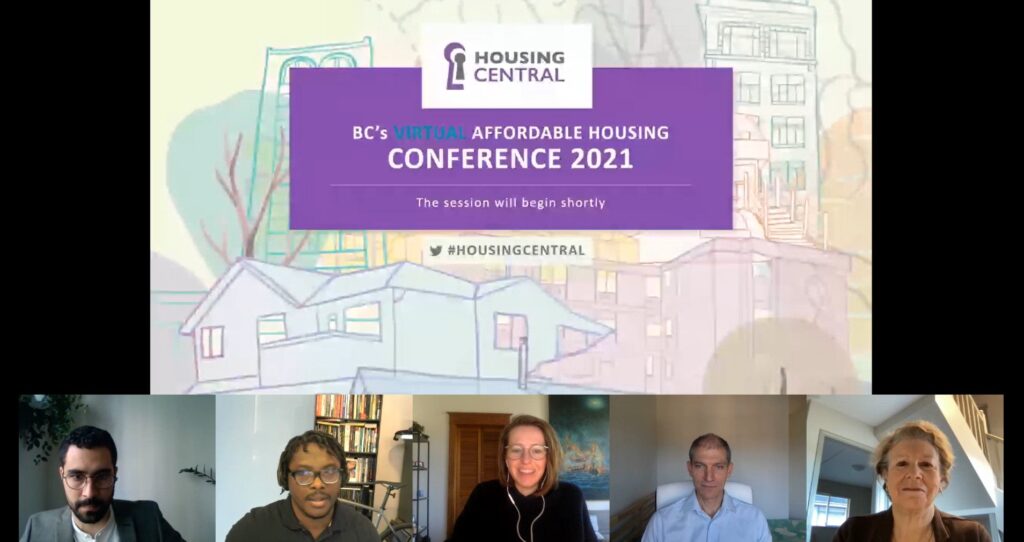
Overview
On November 16, 2021, the Housing Research Collaborative hosted a panel discussion at the 2021 Housing Central Conference, entitled “Financialization of Canadian Housing: Impacts and Solutions.” Over 170 conference attendees joined our speakers for this hour-long session.
Speakers
We convened a number of researchers who are currently participating in the Balanced Supply of Housing Node, and in particular, the working group on Reshaping the Financialization of Housing. The panel, which was moderated by our Director, Dr. Penny Gurstein, included:
- Tom Davidoff, Director, UBC Centre for Urban Economics and Real Estate
- Alan Walks, Professor, Department of Geography and Planning, University of Toronto
- Nemoy Lewis, Assistant Professor, School of Urban and Regional Planning, ‘X University’
- Martine August, School of Planning, University of Waterloo
Session Description
Financialization of housing occurs when housing is treated as a commodity — a vehicle for wealth and investment — rather than as a social good. This panel of housing experts with varying perspectives spoke to the impact that it is having on the delivery of affordable housing, as well as to solutions to mitigate the most negative impacts.
Dr. Davidoff spoke about the history and definition of financialization of housing, and how identifying the root cause of issues such as the predatory practices of landlords and rising rents and home prices is a complex undertaking. His presentation argued that the involvement of outside investors in local markets (e.g. foreign investors, REITs) might not actually be causing increased prices, but instead be an effect of an attractive market. He stated that housing researchers and advocates need to be more precise about the language of “financialization” and make sure that their efforts are tackling the right problems.
Dr. Walks then examined how the financialization of owner-occupied housing helped create the rental housing crisis that financialized landlords are now taking advantage of. He showed how outstanding securitized mortgage credit has grown exponentially since the early 2000s as the average mortgage amount issued to households grew. This process resulted in an under-investment in the traditional multi-family sector while rising values incentivized the redevelopment of older rental units into new ownership units. He concluded by framing the financialization of home ownership in Canada as an immense policy failure.
Dr. Lewis’ presentation focused on a human rights approach to the issue of financialization. He argued that an understanding of the anti-Black nature of financialized landlords’ everyday business and management practices is missing from the discourse on the financialization of rental housing. Using examples from the Toronto market, he discussed how legislation has promoted the development of an oligopolistic rental market, and how investment by public pension funds and university endowments have further financed the displacement of racialized and economically disenfranchised households.
Finally, Dr. August’s presentation looked at the rising trend towards financial ownership of both rental housing and seniors housing in Canada, and the negative impacts of financialization on tenants of apartments and senior living facilities. Financial firms are organized around objectives to maximize shareholder profits and executive compensation. They treat multi-family and seniors’ housing as a financial asset, and will prioritize profit-making other goals such as high-quality living spaces and health care services.
Feedback
Session feedback was very positive, with attendees submitting comments such as:
“Very engaging session. Really appreciated the panel’s expertise and it was so interesting to tune into the debate between the panelists. Gives a broader sense of how complicated the housing market is. Very knowledgeable group.”
“We need a whole conference just on this topic. Incredibly well done.”
“I’ve been attending this conference for 12+ years and this was far and away the most interesting, riveting discussion I’ve ever been to. I would extend that to the dozens and dozens of UDI events I’ve been to as well. Well done. I hope it’s available to watch later, I would love to re-watch it.”
